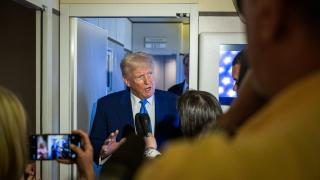April 17, 2025 (EIRNS)—It appears that U.S. President Trump has again pulled back from the brink of what would surely have been a global conflagration—he nixed Israeli plans to launch a massive strike on Iran’s nuclear facilities, a strike that was to have been conducted as early as next month.
But this moment of restraint comes against a volatile backdrop.
In Ukraine, the NATO-Russia conflict will continue, if Zelenskyy and NATO elites get their way. The provocations continue: A Ukrainian drone was brought down near Europe’s largest nuclear power plant, which is under Russian control, and Kiev is making claims of Russian chemical warfare in the hopes of catalyzing a news cycle about Putin the barbaric chemical weapons killer.
This is a war that NATO has been losing, and sane European leaders seek peace. Leaders from Slovakia and Serbia are planning to attend the May 9 Victory Day parade in Moscow, celebrating the defeat in Europe of the Axis powers led by Nazi Germany.
Trump’s tariff tantrum, primarily against China at this point, has reached a peculiar stage. The U.S. is considering tariffs on rare earth metals and magnets that China will not sell to the U.S. Instead of targeting tariffs to help the growth of specific industries domestically, it is finished goods from China (think cellphones and computers) that are getting a tariff break, while intermediate goods (the sort of things an American manufacturer would import) have extraordinarily high tariffs.
Even if Trump’s tariff tantrum brings countries to the table and results in some agreements that might seem ostensibly beneficial to the U.S. from a monetary standpoint, this childish, erratic approach to diplomacy behavior is not the basis for creating a harmonious, human future for generations to come.
When Trump says he wants to use tariffs to bring employment back, one has to ask, “How far back?”
Accompanying what would be a great leap backward for the economy, is an attempted Cultural Revolution that seeks to replace DEI (with outsized claims about racism and transphobia) with … a different DEI (overblown and dishonest claims of antisemitism). Harvard University has refused the attempted overreach by the White House, which had demanded numerous changes to Harvard’s policies on the basis they are necessary to protect civil rights and punish the kinds of behaviors they include in their expansive definition of “antisemitism.”
But beyond this turmoil, there are signs of a different future:
• In South America, Chinese engineers are working with Brazilian counterparts to plan out a bioceanic transport corridor, reaching from Brazil to the Peruvian port at Chancay, joining the Atlantic Ocean with the Pacific and upgrading the economic potential of the vast interior of the continent.
• Light-years away, scientists analyzing atmospheric data from a distant planet may have have found signs of life, detecting molecules that—on Earth—are produced only by living things.
In an April 17 dialogue, Schiller Institute founder Helga Zepp-LaRouche and former U.S. Ambassador Chas Freeman reflected on what a truly cooperative international paradigm could look like—one rooted in mutual development, scientific progress, and shared security.
The choice we face is between regression and discovery, between cycles of crisis and the creation of a durable peace. Humanity’s long-term survival will not be secured by sanctions or military strikes, but by rediscovering its mission: to discover, to create, to develop.






